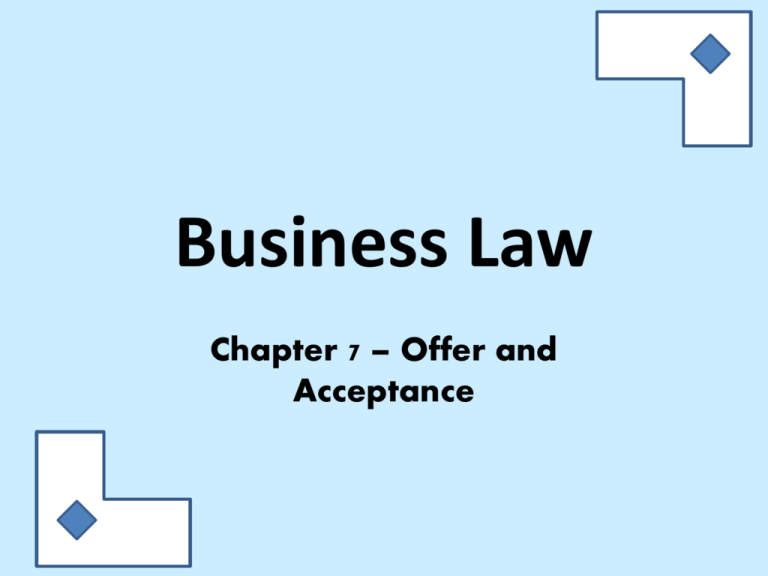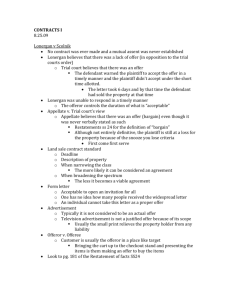Business Law
advertisement

Business Law Chapter 7 – Offer and Acceptance Celia had worked after school since she was 14 to save money for a car. When she turned 18, she bought a VW. Two weeks later she was driving a group of friends to school. The car stalled at a stop light and people behind her began honking. Celia became frustrated when the car wouldn’t start and said, “I’ll sell this thing for $300 right now!” Joan gathered three hundred dollars from her purse and handed it to Celia stating, “ I accept, here’s your money.” 1. Should Celia be bound because the literal meaning of her words suggest she intended to sell the car? 2. Should Celia not be bound to sell the car because the circumstances (new car stalls and people are honking) suggest that she did not intend to sell? Lesson 7-1 – Creation of Offers GOALS… • List the elements required to form a contract. • Describe the requirements of an offer. Lesson 7-1 – Creation of Offers • A contract is an agreement that courts will enforce. Contracts between two parties are the basis for all economic activity. They are the legal links between the individuals and companies producing and consuming goods and services. • There are six major requirements that must be satisfied before courts will treat transactions as contracts… These requirements are… Lesson 7-1 – Creation of Offers • Offer and Acceptance – There must be a serious, definite offer to contract. The terms of the offer must be accepted by the party to whom it was communicated. • Genuine Assent – The agreement (offer and acceptance) must not be based on one party’s deceiving another, or an important mistake, or on the use of unfair pressure exerted to obtain the offer or acceptance. • Legality – What the parties agree to must be legal. So an agreement to pay someone to commit a crime or tort cannot be a contract. • Consideration – The agreement must involve both sides receiving something of legal value as a result of the transactions. • Capacity – To have a completely enforceable agreement, the parties must be able to contract for themselves rather than being obligated to use parents or legal representatives. Lesson 7-1 – Creation of Offers • Writing – Some agreements must be placed in writing to be fully enforceable in court. • In contracts there is the offeror, and offerees (persons to whom the offer is made) • An offer is a proposal by an offeror to do something provided the offeree does something in return. If the offeree accepts the proposal, a contract arises. Generally, to create a valid offer.. • The offeror must appear to intend to create a legal obligation. • The terms must be definite and complete. • The offer must be communicated to the offeree. Lesson 7-1 – Creation of Offers EXPRESSION OF INTENT TO CREATE A LEGAL OBLIGATION.. –the law will only regognize that an offer exists when the offeror appears serious about creating a legal obligation. TEST OF REASONABLE PERSON – is an objective legal test used by jurors or judges rather than a subjective test based on whay you say you were thinking. FACTS AND CIRCUMSTANCES – PRELIMINARY NEGOTIATIONS – SOCIAL AGREEMENTS - Lesson 7-1 – Creation of Offers OFFERS MUST BE COMPLETE AND CLEAR… The terms of an offer must be sufficiently complete and clear to allow a court to determine what the parties intended and identify the parties’ legal rights and duties. COMPLETE – If a purported offer is missing essential information, it is incomplete and legally ineffective. Nearly all offers must identify the price, subject matter, and quantity, either directly or indirectly. Lesson 7-1 – Creation of Offers CLEAR – Each essential term must be identified clearly. IMPLIED TERMS –In some contracts, a term might be implied by law or common business practice. ADVERTISEMENTS – Adverstisements in newspapers and magazines, or radio or television, or in direct mailings are generally not offers. Instead, courts treat them as invitations to customers to make offers. OFFERS MUST BE COMMUNICATED TO THE OFFEREE Lesson 7-2 – Termination of Offers GOALS… • Describe how an offeror can end an offer. • Tell how an offeree an end an offer. • Explain how the parties can create offers that cannot be ended by the offeror. Lesson 7-2 – Termination of Offers Once made, an offer does not last forever. There are several methods used to terminate offers… Revocation by the Offeror – After an offer has been made, the offeror can generally revoke it any time before it is accepted by the offereee. The right to withdraw an offer before it is accepted is known as the right of revocation. Lesson 7-2 – Termination of Offers Time Stated in the Offer – In making an offer, the offeror may state how and when the offer must be accepted. Reasonable Length of Time – When nothing is in the offer about the length of its life, it is alive for a reasonable length of time. What is a reasonable length of time depends on all the surrounding circumstances. Rejection by the Offeree – When the offeree clearly rejects the offer, the offer is terminated. Lesson 7-2 – Termination of Offers Counteroffer – Generally an offeree accepting an offer must accept it exactly as made. If the offeree changes the offeror’s terms in important ways, a counteroffer results. HOW CAN AN OFFER BE KEPT OPEN? Generally, an offeror is not obliged to keep an offer open for specified time even if the offeror has promised to do so. Options - If the offeree gives the offeror something of value in return for a promise to keep the offer open, this agreement is itself a binding contract. It is called an option. Lesson 7-2 – Termination of Offers Firm Offers – A special rule applies to merchants (those who regularly deal in the goods bought or sold). An offer by a merchant for the sale or purchase of goods stating in a signed writing how long it is to stay open is called firm offer. Lesson 7-3 – Acceptances GOALS… • Discuss the requirements of an effective acceptance. • Determine at what point in time an acceptance is effective. Lesson 7-3 – Acceptances Acceptance occurs when a party to whom an offer has been made agrees to the proposal. To create an enforceable contract, the acceptance must.. – be made by the person or persons to whom the offer was made – match the terms in the offer – be communicated to the offeror Who Can Accept an Offer – An offer made to one person cannot be accepted by another. Acceptance Must Match the Offer – The offeror may specify the terms of the acceptance, such as when and how the acceptance must be made. Lesson 7-3 – Acceptances Mirror Image Rule – The mirror image rule requires that the terms in the acceptance must exactly match the terms contained in the offer. Goods – For the sale of goods, as with other types of contracts, if the offeror requires that acceptance must exactly match the terms contained in the offer, then any variation is a counteroffer. Acceptance Must Be Communicated to the Offeror – An acceptance must be more than a mental decision. It must be Lesson 7-3 – Acceptances Silence as Acceptance – One is not obliged to reply to offers made by others. An offeror’s attempt to word the offer so that silence would appear to be an acceptance will not work. Unilateral Acceptance – In some offers, the offeror requires that the offeree indicate acceptance by performing his or her obligations under the contract. Contracts offered under these conditions are unilateral contracts. Bilateral Acceptance- Most offers are bilateral. This means the offer implies that it can be accepted by giving a promise instead of performing the contracted-for-act. End of Chapter Work • Pages 110- 112 • Your Legal Vocabulary – In a document, or on paper, write the term that matches the definition. Each is worth 2 points.








